Beauty and the Beast (Shelley Duvall’s Faerie Tale Theatre) (Dir Roger Vadim, 1984)
Basic plot: Beauty and her two sisters Marguerite and Georgette are living a life of poverty as their father’s merchant ships are lost at sea. When one of the ships arrives in port they think their lives will be transformed, but things do not go to plan. Instead of coming home with the family fortune, their father heads back home with bad news – and to make matters worse he somehow wanders onto the grounds of a castle owned by the Beast and meets with further trouble there. Because he has taken a white rose for Beauty, the Beast tells father that he must die or he must send one of his daughters in his place and then his life will be spared. Beauty decides to spare her father’s life by going to the Beast in his place. Will the Beast kill Beauty?
Cast: The Beast / The Handsome Prince – Klaus Kinski; Beauty – Susan Sarandon; Marguerite – Anjelica Huston; Georgette – Nancy Lenehan; Father – Stephen Elliott; Jacques – Stan Wilson
Filming location: Videotaped at ABC Television Center and filmed on location at Chateau des Fleurs, Lake Arrowhead, California
Release date: 13 August 1984
Availability: Available on Region 1 NTSC DVD for just a few quid. No extras.
The film in full – *SPOILER ALERT*:
Apparently Shelley Duvall produced and hosted the Faerie Tale Theatre TV show between 1982 and 1987, in a bid to bring high quality entertainment to children. First off, I’d question the “high quality” bit after seeing this one episode. And, secondly, if it’s aimed at children, why did she contemplate the idea of getting Klaus Kinski involved and having him dressed up as a hairy beast?!! Thirdly, the introduction she provides for this film, well, quite frankly it gave me the willies. She’s probably trying to look like la belle from Jean Cocteau’s La belle et la bête (albeit it in a sensible jumper and trousers) but she just comes off a bit creepy…
Before I get onto reviewing the film, I’ve just got to say something else:
It says a lot, doesn’t it?
Going back to the Shelley Duvall horse weirdness and how I linked that to Cocteau’s La belle et la bête, well, this version of Beauty and the Beast, directed by Roger Vadim, is a straight remake of Cocteau’s film. A kind of junkshop version, because like I said the quality aspect is not totally evident.
I’m not sure if Vadim was just being lazy and couldn’t be bothered to do his own version, but then again I have never really rated him as a director. Essentially he is better known for his romantic liaisons than his films and it could definitely be said he did much better with the ladies than he did with his film making. However, he did work with the wonderful Julian Maclaren-Ross, Mathieu Carrière and Jane Birkin, so he’s not all bad. And obviously his ability to direct Klaus (if he did?) definitely raises him in my estimation.
Of course it goes without saying that Klaus is absolutely the best thing about this film. He did such a great job of recreating Jean Marais’ Beast that he must have seen the film at least once and memorised all the gestures but I will analyse that in more detail later in this review.
Shot mostly on video and with cheap tinny sounding music piped over the top of sentimental scenes, it doesn’t look or sound terribly good. But then they were working on a tight budget, I guess, and despite everything the sets are not too bad and Klaus’ Beast get-up is excellent. I find Klaus incredibly cute as the Beast – they have Klaus Kinski teddy bears now? I waaaant ooone!
Anyway, the film…
The film starts with some pantomime style silliness from Marguerite and Georgette who are playing on a swing and flirting terribly with an idiot called Jacques. He’s on horseback and apparently has on a new “splendid” jacket – when he asks, “Do you think it suits me?” he does so in such a way that he is getting into “Suit you, sir?” territory. Of course, he has no interest in the sisters, even though they are better turned out than their sister Beauty; he only has eyes for Beauty, who is, as the sisters put it, “…on her hands and knees, as usual.”
In what can only be described as embarrassing, a scene follows where the sisters say how much they hate Beauty’s name: “She should be called Scrubwoman or Scullery.” “Or Mophandle…Or Broom.” If that’s funny, I fail to see the funny side.
All Jacques ever seems to do throughout the film is hang around mooning after Beauty – we don’t know anything else about his character, other than he seems to have asked Beauty to marry him before but she refused because she can’t bear to leave her father. I can think of other reasons not to marry him myself. Not least because he says things like: “You must realise, I’m agonising for your love.” Pass me the sick bucket!
The sisters are all excited because their father has gone off to claim their fortune as one of his ships has arrived in port; they believe he will return with gifts for them and they will be a family of means again. It is not really explained but somehow “through unfortunate circumstances” the father has been unable to claim the fortune and, to make matters worse, on the way home he gets lost in some crap fog in a forest and winds up on an estate belonging to a character called the Beast. He calls out to try and find the master of the estate but when the doors of the castle automatically open he wanders in anyway. Chandeliers held by disembodied arms line the corridor and in the dining room candles light up magically and a fire flares up. As father sits down, a disembodied hand reaches out for his hat and gloves. He looks vaguely amused about this but not too surprised. He says to no one in particular, “I want to thank you for your hospitality, and I am ravenous.” He begins to eat food without being invited, whilst a disembodied hand pours wine for him.
Having fallen asleep after his meal, he is awoken by the sound of a horse outside. His hat and gloves are now in his hand and as he gets up to leave he takes some fruit with him. As he exits the castle, the doors close automatically behind him.
Remembering his promise to his daughters to take back gifts for them, he sees a white rose in the castle grounds and cuts it off to take home for Beauty. Unfortunately he is caught in the act by… THE BEAST! And the Beast is played by Klaus Kinski, so you had better lock up your daughters!
And if there’s one thing you shouldn’t do, it’s stealing white roses from the Beast, here’s why:
“You, you steal my rose! The one I love the most. You could have taken anything except the rose. For this thoughtless robbery, you deserve to die.”
It’s a bit harsh, but the Beast is played by Klaus Kinski after all and we all know what Klaus is like when he’s in a bad mood. So he won’t listen to the father’s sob story about how he finds himself unable to take home gifts for his daughters because he doesn’t have the fortune he was expecting to claim and therefore thought it would be alright to take one of the Beast’s roses for Beauty. Pleading with the Beast, he calls him “My Lord”, and that really gets him angry:
“Don’t call me a lord, call me Beast! You have fifteen minutes to prepare to die. Silence! The Beast commands you. You have stolen my rose. And you must die. …Unless one of your daughters will come to my castle in your place. Then I will spare your life.”
Of course, Klaus – a quick turn around there from fifteen minutes until he dies, to asking him to send one of his daughters instead; I know what your game is!
The Beast tells the father that he must return in seven days or send one of his daughters instead. The pathetic father slopes off on the Beast’s horse Magic, who will take him home if he says in his ear, “Go where I go, Magic.”
At home he explains to his daughters the predicament he is in, he must either return to the Beast’s castle and face certain death in seven days’ time, or one of his daughters must go in his place to save his life. Why he tells them about it when, as he says, he wouldn’t ever allow one of his daughters to go in his place, I do not know. He should have just stayed there and faced his death if that was his intention.
Marguerite and Georgette, already set up as being idiotic, selfish and without morals, suggest that their father should just not go back even if he did promise. But whilst the father is also idiotic, selfish and without morals himself, somehow he says he feels obliged to keep his word and return the Beast.
Beauty says she wants to go in his place because: “I love you. I would truly die of grief if I lost you.” This is just about as sickening as Jacques declaration of love for Beauty – somehow this father-daughter relationship does not seem quite right. As Beauty knows that her father will not let her go, she sneaks off when no one else is around and takes Magic. You can tell this is an emotional scene as the cheap, tinny music is piped over the top of it.
Her father looks for her for all of a minute and Jacques is presumably busy agonising for her love so doesn’t even notice she has gone. The sisters are pleased she has gone until they realise they will have to take on the cooking and cleaning chores and look after their father, who also appears to be agonising for Beauty’s love too. As soon as she has gone he seems to sink into a dark depression. The music must now surely be (as my friend Tom puts it) swathed in waves of melancholy pathos – nope, it’s still those cheap and tinny keyboards.
Meanwhile, Beauty has found her way to the Beast’s castle, seen the strange chandeliers in the hallway and then bumped into the Beast himself. She faints and so the Beast carries her to her room, which has magical powers too. The door opens for the Beast to take Beauty into the room and as they cross the threshold Beauty’s clothes change from rags to finery. The Beast places Beauty down on her bed and she awakens with a start. Yes, it’s Klaus Kinski and he’s in her bedroom!
The Beast warns Beauty not to look into his eyes – he doesn’t like it or something, he doesn’t really explain and she doesn’t ask – and then tells her that she will only see him in the evenings when she dines.
That evening Beauty goes to dine and the chair automatically moves for her to take her seat. She sits down and hears footsteps behind her as the Beast approaches. He tells her that she should not be afraid and asks if he may watch her dine. He tells her that she is the master in his home and then asks her if she finds him repulsive and, of course, she does. Beauty tells the Beast that she is not used to being served but that she can see that he has done everything he can to help her to forget the way he looks. The Beast admits that he is a monster but Beauty acknowledges that “there are men much more monstrous than you but they hide it.” The Beast says that even though he looks so ugly, he has a soul. He says Beauty may have anything she wishes – her slightest whim – but that he must ask her every time they meet if she will be his wife. Even though he asks her in his whispery voice, Beauty still says no.
Back at home the sisters are cooking potatoes in the most unorthodox manner. Somehow this seems important enough to keep in the storyline; it’s not though.
That night Beauty hears screaming and ventures out into the corridor, concealing herself when she sees the Beast coming. The Beast has been out on the razz, killing animals or some such so his paws are smoking. He enters Beauty’s bedroom – what he was going to do at such an hour when his hands are smoking with the blood of dead animals, I don’t know. Finding her bed empty he shouts at the mirror (as you do), “Where is she? TELL ME WHERE SHE IS!!!” The mirror, probably fearing a Klaus Kinski style temper tantrum, turns informant and pictures Beauty concealed in the corridor. In walks Beauty and instead of asking why Beast’s hands are smoking, she asks him why he is in her bed chamber (Bed chamber? Get her!). Now, this is a question Klaus Kinski would have been asked on a regular basis, I imagine, but the Beast not so much. So instead of telling her that he wanted to get his smoking hands on her, with quick thinking he tells her that he came to her room to bring her a gift. Nice save, Beast! He then reveals that it is a pearl necklace (and he’s not being rude on this occasion…), but even so she still tells him to leave. The Beast looks a bit sad, but he leaves the gift anyway – and as soon as the door closes Beauty immediately picks up the necklace.
Walking in the garden, Beauty hears noises and sees the Beast drinking from the pond like an animal. That evening she begs to be able to go home to see her father as she says she cannot live without him. The Beast tells Beauty that he would die of grief and loneliness if she never came back. Beauty strokes the Beast’s head to reassure him and tells him that she would never want to cause his death. The Beast says: “You pity me, like one has pity for an animal.” “But you are an animal”, Beauty replies. The Beast tells Beauty that he will have to consider her request.
In an attempt to curry favour maybe (or am I just cynical?) Beauty tells the Beast that she almost looks forward to seven o’clock when the Beast will present himself for his visit. She tells him that she thinks his voice is getting softer. And suddenly he spots a deer foraging in the bushes – naturally his instincts are to attack, but instead with his ears pinned back he controls himself as he is in Beauty’s presence and ashamed of his bestial urges.
Later he succumbs to the urges and appears outside Beauty’s room in the middle of the night, covered in blood with smoking paws. He asks Beauty for his forgiveness for being a beast. She dismisses him by telling him to clean himself and go to sleep. He screams at her to close her curtain because her look hurts him.
Beauty cries when she sees her father in her mirror – he looks ill and is calling for her (again with the “agonising for your love” business). Beauty tells Beast that she wants to go home as her father is dying. The Beast says he will let her go home if she promises to return in seven days. He gives her a ring and says: “When you go to sleep, put it on your fing-a. Close your eyes, when you open them again, you vill be viz your father.” Beauty puts the ring on and teleports to her father’s bedroom where he is “being ill”. As soon as he sees Beauty he is automatically fit as a fiddle again – surprise, surprise. Beauty tells her father about the ring and how she promised to return in seven days. He and the sisters all show their selfish natures – the sisters, by plotting to steal the jewellery and the father by saying that it would be good if Beauty did not return to the Beast because he would die and he (father) would like that. Why Beauty loves her father so much, I don’t know. He’s a thief and a lazy so-and-so and he wishes death on others. I don’t see what is so lovable about that.
Meantime, Jacques is back on the scene for about 10 seconds to tell Beauty that she looks “more charming than ever” and to be ignored by her. I really don’t know why his character is even in this film as there is no real purpose for him; he does nothing whatsoever to drive the narrative.
The Beast is pining for Beauty back at the castle. He goes into her bedroom, or “bed chamber”, and leaves a white rose on her pillow. Whilst there he takes the opportunity to bury his face in her dressing robe. Beauty hears Beast calling her name and sees him reflected in her mirror. He tells her to remember her promise to him.
Despite telling her father that the Beast treats her very well and that he makes her smile, Beauty’s family have plotted to steal the ring from her and to get Jacques to sell it at the market so Beauty cannot return to the Beast, which would suit everyone; the father because he and Beauty have this weird mutually needy relationship; the sisters because they want Beauty to do all the housework; and Jacques because he will get to be snubbed by Beauty on a more regular basis if she is in the vicinity. Beauty cannot return to the Beast without the ring – rather short-sightedly she blames everything on her “two selfish sisters”, not realising that it was the father who told them to “sell it to some fool.”
Beauty says: “The Beast is dying and I wanna be with him.” In a quick about-turn the father admits he took the ring because he “could not bear to see you in the hands of a monster” but he tells her how she can get the ring back if she must go. Time for the sick bucket again as Beauty tells her father, “I love you forever.” Yuk.
Jacques gets his final moment with Beauty as she stops him en route and takes a stroll with him to get the ring back – as soon as she has the ring she puts it on and disappears before his very eyes. Then Jacques disappears before our very eyes as we never see or hear from him again; I don’t know why he bothered appearing in this film, really I don’t.
Beauty teleports to the castle and calls out for her Beast – yes, now she calls him “My Beast”. She finds him half dead in the castle grounds and asks him to forgive her for being a monster; she gives him the ring in order to heal him and tells him to have courage and to fight. But the Beast says it is too late for him: “If I were a man, I could do as you say. I am but a poor animal, who has lost his love, who can only crawl away and die. Goodbye. Beauty.” His life appears to fade away as she tells him that she loves him and then, with a puff of smoke, Prince Charming appears!
Yes, Klaus dressed as Blue Boy, slathered in make-up. That’s what Prince Charming looks like! And, good lord, I have to tell you that he looked better as the Beast – it’s not a good look…
So why has the Beast died and been re-born as a rather scary looking Prince Charming? Well, that’s simple, it’s because his parents would not believe in fairy tales and so the fairies punished his parents by casting a spell on him which meant he was turned into a beast who would only be saved by the love of a woman. Sounds unlikely to me, but it also sounds like a line Klaus Kinski would spin if he had to.
Beauty asks: “Are such miracles possible?” And the Beast – pardon, Prince Charming, says: “Yes, through love.” Where is the sick bucket again? It gets worse: “Love can make a man become a beast, and love can also make an ugly man beautiful.” Prince Charming asks Beauty if she will marry him and share his kingdom. She doesn’t exactly say yes, but she accepts his offer to fly away through the clouds to his kingdom which is very far away. That’s right, Beauty, forget about the father and your selfish sisters – and Jacques, if you can even remember who he is. I’m not sure that I can…
What’s his name again?
I’m being mean – I really enjoyed this film, for all its faults. But then I do quite like a bit of badly made film from time to time. It’s just that this is not really a patch on Cocteau’s 1946 version La belle et la bête…
Having seen La belle et la bête and Beauty and the Beast a few times each now, I can tell you that what Klaus says in the Other information about the film section below is not 100% true. He is not the only one to use Cocteau’s words from La belle et la bête verbatim, as Susan Sarandon also uses some of the verbatim text throughout Beauty and the Beast. But the text is not the only aspect of the film that has been lifted directly. Below I will attempt to compare and contrast the two films:
Well, let’s just say that stylistically there is no competition between the two films – naturally, Cocteau’s film is head and shoulders above the Vadim remake. Even from the introduction, where instead of having scary Shelley on horseback, you have Jean Cocteau who makes writing on a chalkboard for the credits look like a major work of art; everything he does, he does with style.
However, the aspect of Beauty and the Beast that I most detested – the stupid pantomime style slapstick sections involving the sisters and the suitor – is also present in La belle et la bête. But to add to this, Belle (played by Josette Day) also has an idiotic brother in La belle et la bête. And the main difference is that whilst Jacques, the suitor in Beauty and the Beast, was a bit of a non-entity, his counterpart in La belle et la bête, Avenant (played by Jean Marais), does actually serve to drive the narrative forward.
Whilst in Beauty and the Beast the suitor is unimportant and his love is not reciprocated by Beauty, Belle claims that she does love Avenant in La belle et la bête and when Bête (also played by Jean Marais) dies at the end of the film, Avenant also dies. Whilst Avenant transforms into Bête, Bête transforms into a Prince Charming version of Avenant (you guessed it, played by Jean Marais); a kind of hybrid version with the good side of Bête combined with the looks of Avenant.
Whilst Avenant is a very quick tempered character (he slaps one of Belle’s sisters and also punches her brother Ludovic when they get into an argument), he at least reacts and is determined to go and see Bête to kill him when Belle says she must return to him. Avenant is not a nice or a good character but Belle sees something in him which she finds attractive – probably something to do with his chiselled jaw and his body, rather than his mullet hairdo:
Belle’s brother Ludovic is one of the causes of the family’s financial difficulties. Unlike in Beauty and the Beast the difficulties in getting the ship back are explained in that the creditors have impounded the ship and its cargo, which means that their father cannot get to it. However, to make matters worse, Ludovic who has huge gambling debts had signed a document to say that the moneylenders could claim their money from his father if he was unable to pay the debt; he had done this on Avenant’s advice as they believed that the father was bound to return with great wealth, which would enable them to pay off the debts with no problems. With the moneylenders taking their furniture and belongings, the family are poverty-stricken.
On his way back from the ship, the father (like the father in Beauty and the Beast) gets lost on his journey through the forest and finds his way accidentally onto the grounds of Bête’s castle, where the castle doors open and he enters. Unlike Beauty and the Beast, the camera lingers long enough over the human statues and chandeliers to enable the viewer to understand that these usually inanimate objects are animated; more time is taken to show the chandeliers being lit up and moving one by one to point the way. Unlike the father in Beauty and the Beast, the father in La belle et la bête is amazed and thrown by what he sees before his eyes; when the disembodied hand pours him a drink, he looks under the table cloth to see if there is someone hiding there and he sniffs his drink before taking it. There is no real sense of amazement in Beauty and the Beast and therefore I wonder how Vadim expected the audience to react to that; if the characters in the film are not amazed, would we even notice that anything magical had happened?
The scene where the father is confronted by Bête for stealing the rose is played almost exactly the same in Beauty and the Beast:
Compare this text with the text I gave above for Beauty and the Beast and even with a French-English translation, you can tell that what Klaus says about using Cocteau’s text verbatim is right:
“So you would steal my roses, sir? The roses I love above all else. Your misfortune, sir. You may steal anything but my roses. Merely for this theft the reward is death… Do not say “My Lord”, I am “The Beast”. I dislike compliments. Do not seek to understand. You have fifteen minutes to prepare for death. The Beast commands you to be silent. You have stolen my rose and you shall die. Unless… one of your daughters… Unless one of your daughters is willing to die in your place…”
From thereon in, the following scenes play out similarly with the father leaving on Bête’s horse who, rather than being called Magic as in Beauty and the Beast, is called Magnifique or Magnificent. However, the horse requires the same order to take father home: “Go, Magnificent, go where I am going.”
The main difference when Belle enters the castle is a stylistic one – everything Josette Day does, she does with a sense of gracefulness and drama and it has to be said, unlike Susan Sarandon (who is not bad looking, don’t get me wrong), she is absolutely stunning as Belle. Everything looks utterly perfect. Josette Day often appears in slow motion or in gliding motions towards the camera or in dramatic poses; this version is far more theatrical than Beauty and the Beast. Just a guess here, but even if the budget and art direction allowed it I doubt there would have been enough time to include such beautiful scenes in Beauty and the Beast, which is about half the length of La belle et la bête.
Another aspect of Cocteau’s film which is not so present in Vadim’s is the importance of the magical items – whilst the mirror in Beauty and the Beast enables Beauty (and Beast) to see who and what they want to see (for example, Beauty seeing her father or the Beast; Beast seeing Beauty), it’s magical powers are not explained. In Cocteau’s version, the mirror speaks to Belle and explains: “I am your mirror, Beauty. Reflect on me, and I shall reflect for you.” Later, she will be given the other secrets to Bête’s power: a special golden key, a glove which will transport her where she wants to go, and Magnifique the special horse (who will also take her where she wants to go). The other magical item is, of course, the rose, which as Bête will later say, “has played its part”.
When Belle first encounters Bête, she is as shocked and frightened as you would expect someone to be, unlike Beauty in Beauty and the Beast. Okay, Beauty faints too when she first encounters the Beast, but compare these images below and see which one looks most convincing:
Again, the scene where Bête first joins Belle whilst she is dining has almost been lifted entirely by Vadim for Beauty and the Beast. The text is almost exactly the same and the way Bête rests on the back of Belle’s chair is repeated almost exactly the same by Klaus Kinski as the Beast:
For the scene where Bête / Beast comes in with smoking hands from attacking animals, aside from the fact that Josette Day conceals herself behind an impressive looking statue in La belle et la bête and Susan Sarandon has to make do with just a curtain in Beauty and the Beast, again the scenes are very similar. Both Bête and the Beast consult the mirror to find out where Belle / Beauty is and then sweep their hands (paws?) over the mirror to make the image disappear:
Unlike the scene in La belle et la bête, in Beauty and the Beast when Beast presents Beauty with the pearl necklace there is no magic to the moment. In La belle et la bête, the pearls fly one by one into Bête’s paw until they make up an entire necklace for him to offer to Belle.
The scene with Bête drinking water from the pond like an animal is reproduced exactly the same in Beauty and the Beast, but the scene where Bête sees the deer and resists attacking it is played out to better effect in La belle et la bête as there is more of a sense of Bête having to fight his urges. And at the end of this sequence Belle takes Bête’s hand as they walk away together, which does not happen in the Kinski-Sarandon version. Furthermore, Belle allows Bête to drink water from her hands in this sequence, which also does not take place in Beauty and the Beast.
The sequence where Belle asks to leave to see her father and Bête says he would die of grief if she did not return, again, is almost exactly the same in Beauty and the Beast, with Belle stroking Bête’s head. But in La belle et la bête, as Bête considers Belle’s request he asks her to take a walk with him and questions her on the subject of whether or not she has been asked in marriage and who the young man is who has proposed marriage to her. This scene, of course, would not take place in Beauty and the Beast as Jacques is never considered by Beauty as a marriage prospect and is not important to the narrative in the way that Avenant is; Belle has to tell Bête about Avenant as Bête’s and Avenant’s destinies are tied in the ending where Belle meets her amalgam Prince Charming.
This scene is followed by Bête going off and killing animals, arriving at Belle’s room with smoking hands and covered in blood. His anger at Belle’s love of another explains his behaviour in La belle et la bête, whereas this scene in Beauty and the Beast is not so clear; the Beast had resisted attacking the deer in Beauty’s presence but there seems to be no motivation for his subsequent attack, other than perhaps his urge to act like a beast?
The way Belle deals with Bête’s animalistic behaviour, however, is almost exactly the same in Beauty and the Beast with the dismissal and the order for Bête to go away and clean himself up and go to sleep.
But when Belle asks to go home again because she believes her father is dying, Bête introduces another aspect to the story which does not appear in Beauty and the Beast and this is the Pavilion of Diana, which he says is the only place in his domain where none may enter. Bête tells Belle that all he possesses is his by magic, but that in the Pavilion are real riches which can only be accessed with the golden key. Bête gives the key to Belle as a symbol of his trust in her. In Beauty and the Beast it is clear to Beauty that if she does not return that the Beast will die and I guess this is enough. But in La belle et la bête, Bête tells Belle that not only will he die if she does not return but that all of his riches will be hers as she has the golden key. This is a double temptation for Belle.
When Bête says that Belle can go home to see her father he explains to her that: “You shall be home this very morning. My night is not yours. It is night with me, but morning for you.” In Beauty and the Beast this is not explained so clearly, what the Beast says to Beauty in this version is: “Tomorrow morning you will be with him. The night you spend here. The day you will be home.” It doesn’t make total sense in this way. In La belle et la bête the sense is that Bête lives in a different world, where Belle’s day is his night.
Belle is told that the magic glove will take her where she wants to be, in the same way that the ring will take Beauty to where she wants to be in Beauty and the Beast. However, Beauty merely teleports herself into her father’s room, whereas Belle is seen physically flying through the wall in slow motion in La belle et la bête. This is not the only difference in this scene, and whereas the conversation with Belle’s father plays out largely the same as the one between Beauty and her father in Beauty and the Beast, there are some aspects of Belle’s conversation that are not adopted. Furthermore during the conversation when she begins to cry, her tears fall as diamonds on her cheeks; this does not appear in Beauty and the Beast. Belle sees these diamonds as a gift from Bête but her father considers them to be the devil’s diamonds.
Belle takes a walk with her miraculously cured father in the garden. Seeing Belle in her fine clothes and jewellery, naturally the two sisters are incredibly jealous. But Belle in a demonstration of her generosity of spirit offers her pearl necklace to her sister Félicie – as her sister takes it, it turns into a piece of rope in her hands. Belle’s father tells her: “The Beast gave it to you, so you cannot give it away.” This may serve as a reminder of what Bête said about owning things by magic; only the treasures in the Pavilion of Diana are real. This scene does not appear in Beauty and the Beast.
Likewise, the scene where Avenant questions Belle about whether or not she loves Bête does not appear in Beauty and the Beast for reasons previously discussed; the fact that Jacques is not a serious love interest.
This scene is the key to the film’s closure – Avenant is jealous that Belle will return to Bête and therefore he wishes to kill him so she can stay at home and he can court her there; Ludovic wants to know how he can get his hands on Bête’s treasures, as do the sisters Félicie and Adélaïde. The sisters go and see Belle and, in one of the film’s silliest sequences, use onions to make themselves cry so they can make Belle believe they have changed their ways and are sad she is going to leave. Whilst Belle is consoling them, Félicie steals the golden key. The sisters then have to rely on the boys to “worm” the information out of Belle so they can find Bête and kill him and steal the treasures; they tell Avenant that they will give him the key if he goes.
Another scene with Avenant follows where he tells her that he will free her from her nightmare and that Bête cannot be suffering as he does, because if he did he would come and take Belle away; Avenant is convinced that Bête has forgotten Belle.
This is not true, however, as in a scene similar to the one in Beauty and the Beast Bête goes to Belle’s room and puts Belle’s bedcovers to his face. Unlike the Beast, however, he is shown wearing one glove (a little like Michael Jackson, I guess) because he has given Belle the other one so she can transport herself.
From hereon in, the two films separate slightly due to Avenant’s and also (to a lesser extent) Ludovic’s involvement in the events that follow. A riderless white horses appears – Magnifique – and the sisters recognise this as a sign that Bête is sending for Belle but suggest that Ludovic and Avenant can go instead of Belle; they give them the golden key and send them off.
Immediately they start to panic that they may have sent the boys to their deaths. And upon spotting the mirror, the sisters catch their reflections and see something they would not expect to see:
The image of the monkey is amusing in that one of the sisters had earlier asked their father to bring a monkey back for them.
Outraged at what they have seen, the sisters give the mirror to Belle and upon reflecting in the mirror she sees Bête suffering and knows she must return. Unlike in Beauty and the Beast the means of transportation has not been stolen from Belle – the glove – however, she has not yet remembered the golden key. So she at first puts on the glove and transports herself to her bed at the castle and then remembers the golden key and returns home for it. She cannot find it anywhere but does not even have time to find out who has stolen it as her mirror shatters and she knows she must return immediately, with or without the key.
Belle goes looking for Bête in much the same way that Beauty searches for the Beast and puts the glove on his hand to revive him, like Beauty puts the ring on the Beast’s finger (or fing-a as Klaus says). Bête tells Belle that she is too late and as Ludovic and Avenant debate about whether or not to use the golden key or whether the key is a ruse, Belle and Bête have the same conversation that Beauty has with Beast about fighting to live: “If I were a man… no doubt I would do as you say. But poor beasts who wish to prove their love can do no more than lie down and die.”
As Bête finishes his speech, Avenant smashes the glass roof on the Pavilion of Diana and tries to jump down into the pavilion to get the treasures. Suddenly the statue of Diana (the huntress) comes to life and shoots him in the back with an arrow. Ludovic looks on as Avenant dies and his face transforms into that of Bête.
Belle asks where Bête has disappeared – his body has vanished in front of her eyes – and suddenly the Prince Charming Bête-Avenant amalgam appears in his place all spruced up and with a nice haircut as well. His explanation as to what happened is as unrealistic as Klaus Kinski looking like a young prince at that time in his life: “The Beast is no more. It was I. My parents did not believe in magic. Through me they were punished. Only when looked on with love could I be free again.”
Aside from the fact that Belle tells the Prince Charming that he reminds her of someone she knew – a friend of her brother – the rest of the film plays out as in Beauty and the Beast. One final difference is that the Prince says that Belle’s father can come and join them in their kingdom and that the sisters shall bear her train when they marry. Ludovic is not mentioned at all; nor Avenant.
And they all lived happily ever after &c.
Watching the Cocteau version with the audio commentary by Christopher Frayling (it’s full of very interesting information), I was struck by the talk of all the influences on Cocteau’s version: Vermeer lighting; Rembrandt’s anatomy lesson; Comédie Française; Méliès, etc. The only influence you pick up on in the Vadim version is Cocteau. Although it is interesting to note that some of the speeches are said to have been used verbatim from the original fairy tale by Gabrielle-Suzanne Barbot de Villeneuve, the visual aspects were all down to Cocteau. The funniest story I garnered from the audio commentary was about how René Clément – the technical advisor on the film – had to stand behind Jean Marais and poke his beast ears with a forked stick to make his ears appear to twitch when he saw the deer!
Anyway, as Klaus fans of course we have to see Klaus playing the Beast, but I am sure most will agree that the images from Cocteau’s La belle et la bête are evidence enough that the 1946 version as well as being the original, is also the best version of Beauty and the Beast; Vadim’s 1984 version just isn’t a patch on it. Other than the rather cuddly looking Klaus Kinski-Beast, of course!
Other information about the film: In an interview with Marisa Meltzer for Babble, Bridget Terry (who produced the TV series with Shelley Duvall) tells this great story:
“In Beauty and the Beast, we had a hard time with Klaus Kinski. Susan Sarandon played Beauty, and at one point, he was walking down the hallway carrying her for a scene, and Roger Vadim, our director, yelled “cut,” and he just dropped her. It was really tense between them. Later, when he turns into a prince, he brought in Thomas Gainsborough’s painting “Blue Boy,” and said he wanted to look exactly like that. We brought in rubber bands to pull his skin back to make him look . . . more princely. We’re filming and we do this effect where he turns from the beast into the prince and Susan Sarandon’s line is, “Are such miracles possible?” She couldn’t say the line without cracking up. He was getting angrier and angrier and the bands holding his skin back started popping.”
See the full interview here: http://www.babble.com/kid/kid-activities/faerie-tale-theater-bridget-terry-classic-childrens-fairy-tales/index2.aspx
In Christian David’s Kinski Die Biographie (Aufbau Verlag, Berlin, 2008) it says that filming took place between 7-9 July 1983 and that Klaus later said very negative things about this project. It seems that Klaus had originally been told that Jessica Lange would be Beauty to his Beast and so he was obviously a little annoyed when he had to make do with Susan Sarandon instead, I think it says something along these lines: “Instead, they want to palm me off with a playhouse tart from New York.” In any case, whatever it says, it’s certainly not complimentary!
In Kinski Uncut (Bloomsbury Publishing, London, 1997, pp309-310) he has the following to say:
“Beauty and the Beast for ABC in Hollywood. I think of Cocteau’s magical film. I can’t think of anything else, not even when I read the hair-raising script, which degrades the most beautiful of all fairy tales to banal Hollywood trash.
They promised to get Jessica Lange to costar. Instead they want to force some New York actress on me. They do give me the right to translate Cocteau’s words verbatim, from French into English – but all the other characters speak the unimaginative, proletarian, idiotic dialogue of the American TV version. The shooting is indescribable.
I do the flick in five days. In the middle of the close-up of the death scene, the prince who’s been transformed into a beast is saying, “A poor animal that’s lost its love can only creep away and die.” Then some creep yells through the loudspeakers: “Quitting time!”
It’s about six in the afternoon. The working day set by the union is over!”
Klaus can’t have been paid a lot for his work in Beauty and the Beast as Bridget Terry says in the Babble interview that despite the calibre of the stars involved in the series, nobody got paid more than $7,500 even though they often worked 14 hour days. This could have been another reason that Klaus was not totally enamoured of this project, I suspect!
However, I imagine it was working on a Cocteau re-make that piqued Kinski’s interest in the first place. After all, Klaus had appeared in stage versions of Cocteau’s La machine à écrire and La voix humaine. Kinski met Cocteau, and in Kinski Uncut (p92) he says that Cocteau kissed him and said: “Your face is as young as a child’s and yet your eyes are utterly mature. They switch from one instance to the next. I’ve never seen such a face.” He also says when living a rough life, hard-up in Marseilles he wrote to Cocteau to ask for money and got the following response (Kinski Uncut, p119): “My dear friend, I would share everything with you… Unfortunately I own nothing. I live off the generosity of others. I am ill and already have one foot in the grave. I am sending you this drawing; perhaps you can sell it. Your friend, Jean Cocteau” Kinski says, “The envelope contains one of his typical drawings, my portrait from memory. He’s given me the mouth of a black man and eyes like stars. The miners [in Marseilles] will hardly buy the drawing from me.”
I wish I could see that drawing!
Click the image to purchase from Amazon
Click the image to purchase from Amazon

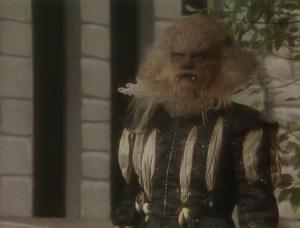
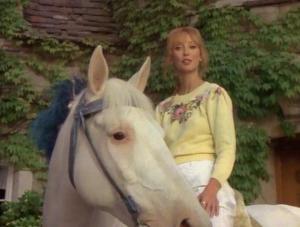
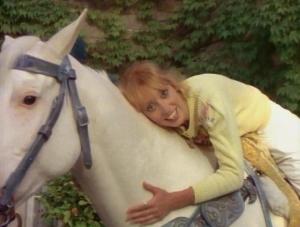
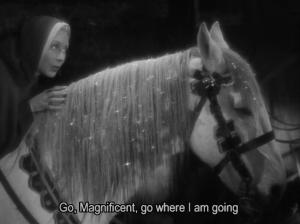
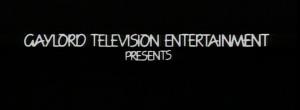
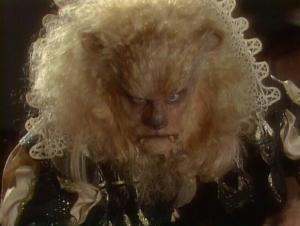
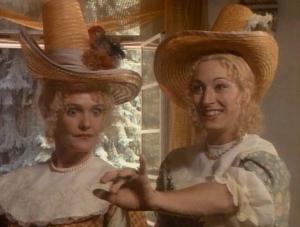
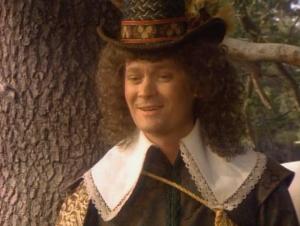
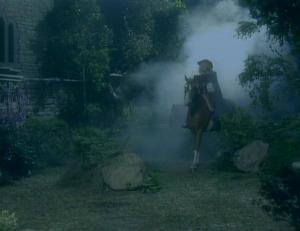
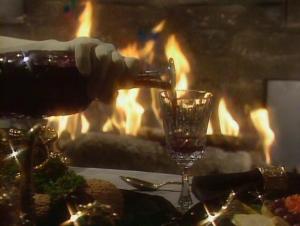
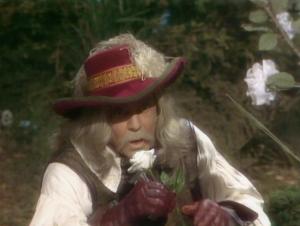
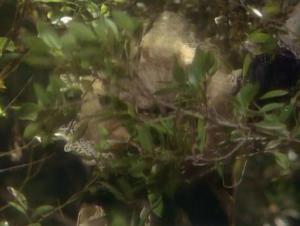
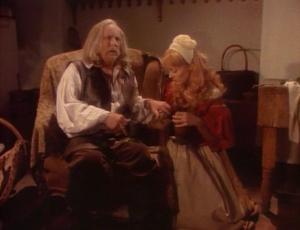
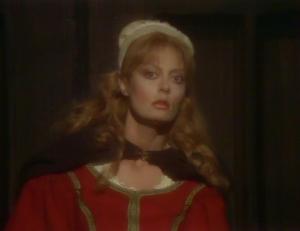
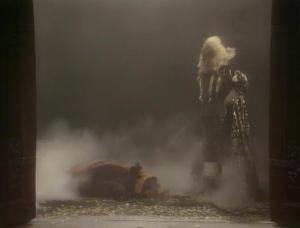
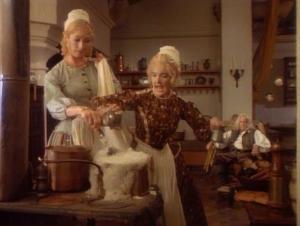
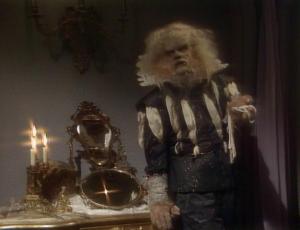

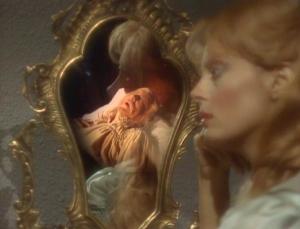
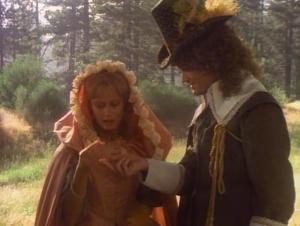
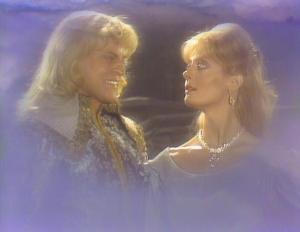
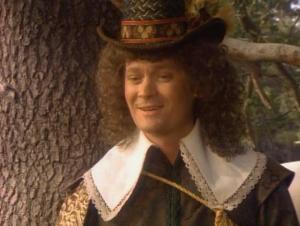
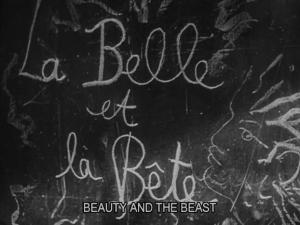
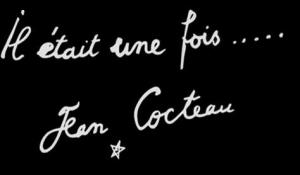
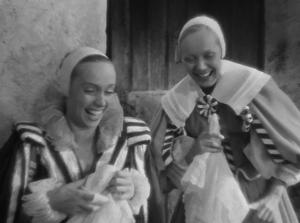
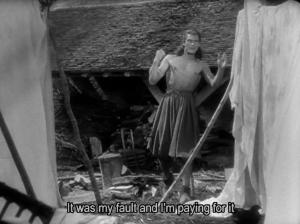
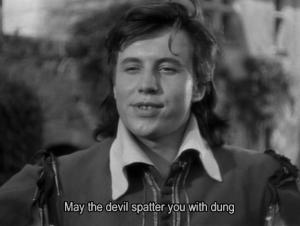
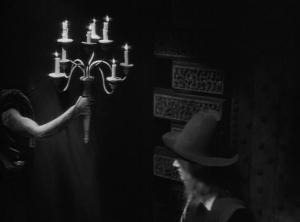
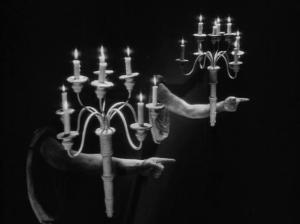
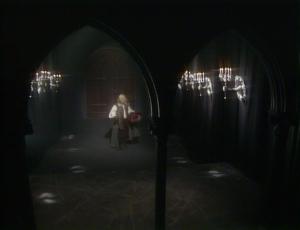
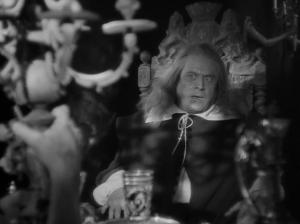
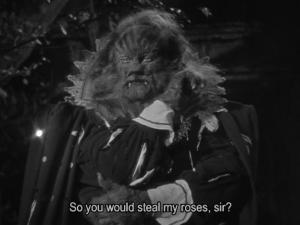
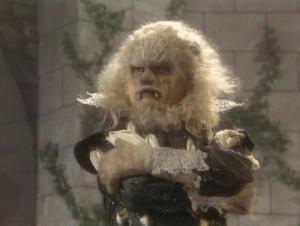
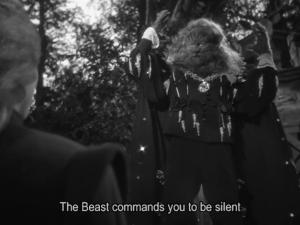
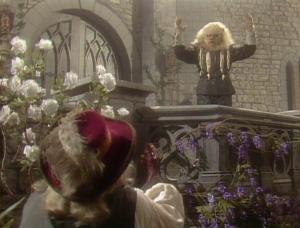
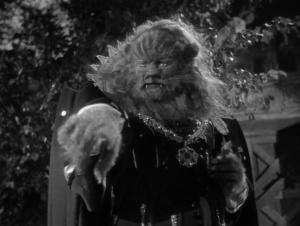
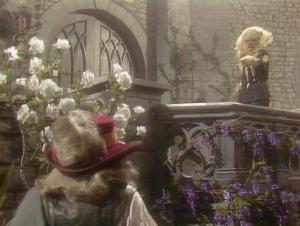
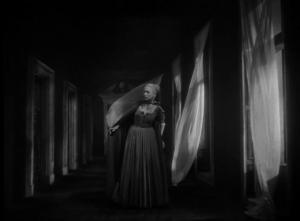
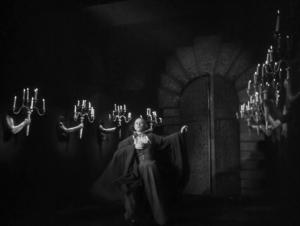
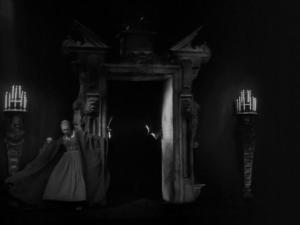
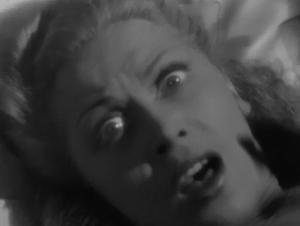
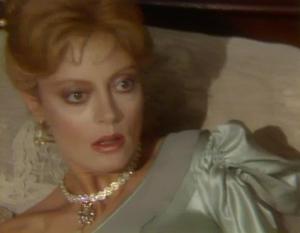
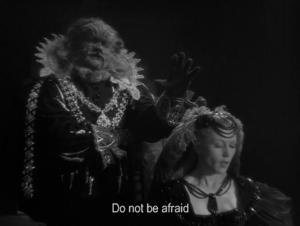
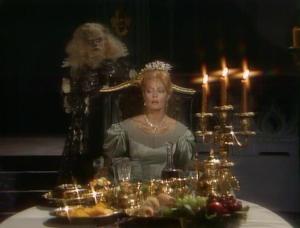
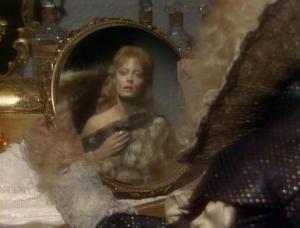
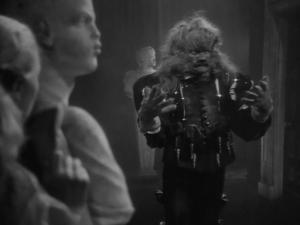
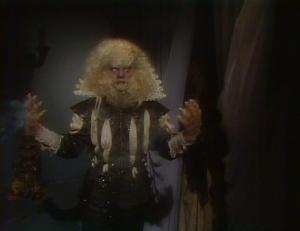
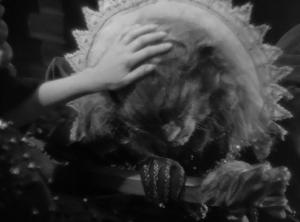
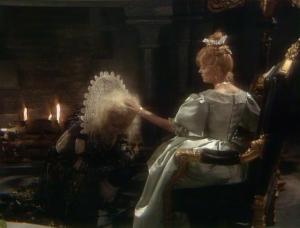
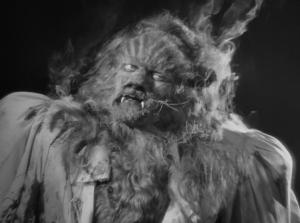
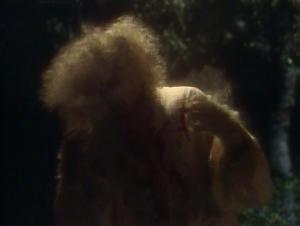
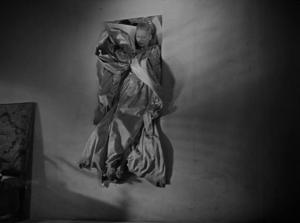
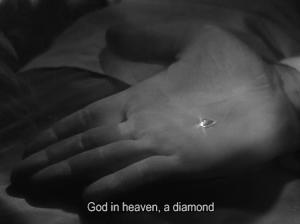
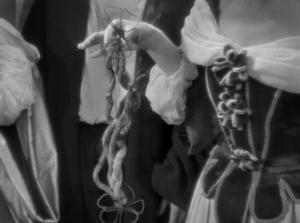
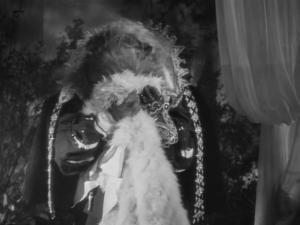
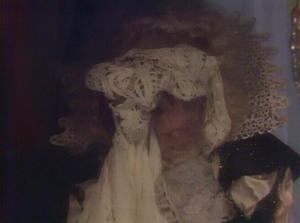
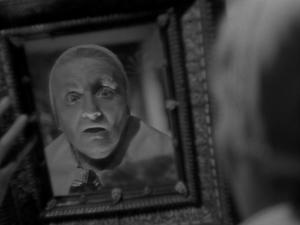
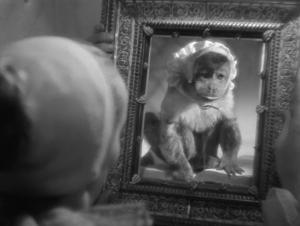
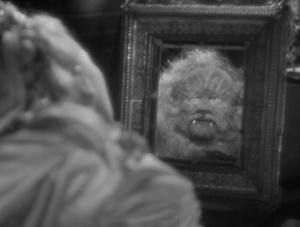
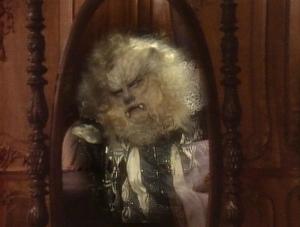
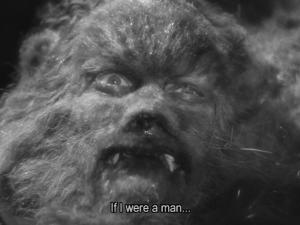
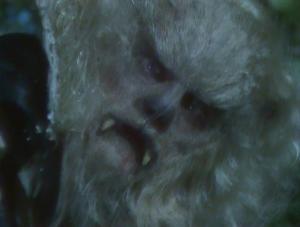
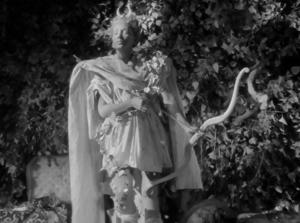
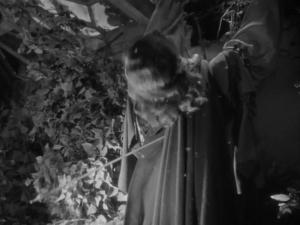
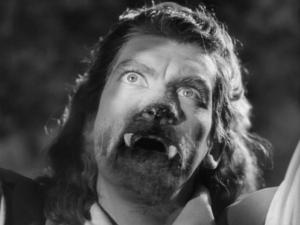
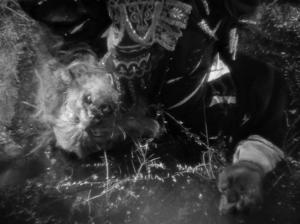
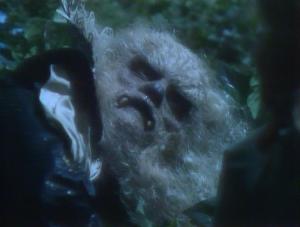
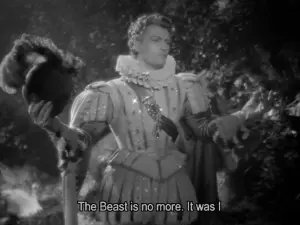
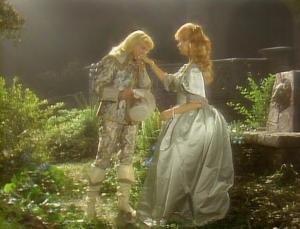
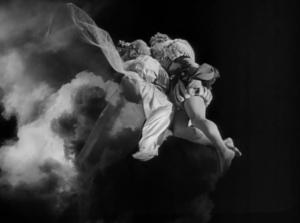
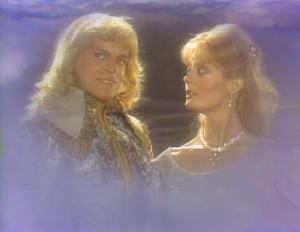
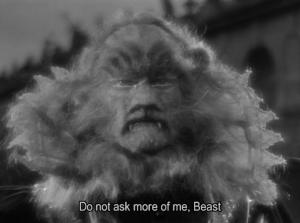
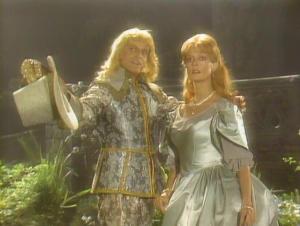
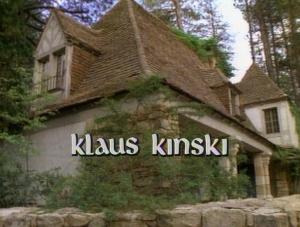
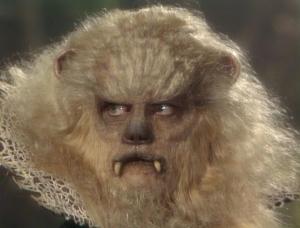


this pics scare the hell out of me! XD
Aw! I thought Klaus looked lovely and furry as the Beast – the picture of him as the Prince Charming, however, is another matter!
You really shouldn’t bash Shelley Duvall’s Faerie Tale Theatre…I mean seriously…Cocteau’s own masterpieces were filmed on a shoe string budget back in their day – and managed to create unspeakable things. Shelley’s episodes, if anything, acted as a conduit to a generation that needed to be entertained and instructed. I was able to oberve styles of artists and acting talents that the world cannot deny to this day were pioneers in their skill. I was introduced to Klaus Kinski, who speaking of which didn’t exactly get held at gunpoint to do the project. He could have said “no”.
Hey Erik! Sorry you’re so offended by my comments, but you can’t really tell me what to like and what not to like. You’re free to write your own articles praising Shelley Duvall’s Faerie Tale Theatre if you so wish, but my article expresses my views which unfortunately do not coincide with yours so we’ll have to agree to disagree on this one. Yes, Cocteau’s film may have been done on a budget too, but as I believe I showed in my article comparing the two films he did his version with so much more style; he, in your words, “managed to create unspeakable things”, but unfortunately the Faerie Tale Theatre version is just not in the same league, despite the cast. Lucky you for being introduced to Klaus Kinski. You will note that I said although Klaus said some disparaging things about the film himself, he didn’t exactly do it for the money (which he said was the only reason he ever did any film) so, yes, you are right. But just because he agreed to do it, it doesn’t mean that the project was a good one. My website, and many others about Klaus Kinski, show that he could have done with being a bit more discriminating when it came to picking and choosing his projects – but he wasn’t. He worked on whatever was offered to him, for whatever reasons he had (money, schedule, other reasons). I’m rather fond of Klaus Kinski, as you will gather, but it doesn’t mean I have to adore every film he ever did. He certainly didn’t himself!